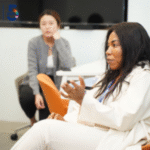The concept of discourse extends far beyond words and sentences—it encompasses the frameworks of communication, power, and ideology that shape how societies think, act, and respond. In recent years, Nigeria has witnessed an unsettling rise in what scholars and analysts call “discourse weaponization”—the deliberate manipulation of language and narratives to control perception, silence dissent, and divide communities.
Understanding Discourse Weaponization
Discourse weaponization occurs when language is strategically used as a tool of influence, not for truth or clarity, but for domination and distortion. It transforms communication into a battlefield where words become weapons—shaping opinions, discrediting opponents, and redefining reality itself. In Nigeria’s political and social spaces, this trend is becoming increasingly visible.
Public debates, media conversations, and even religious or cultural discussions often reflect polarized narratives. Instead of fostering understanding, dialogue is hijacked by rhetoric designed to provoke emotion, inflame division, or advance hidden agendas. This manipulation weakens critical thinking and discourages balanced reasoning—key pillars of democratic discourse.
The Role of Media and Social Platforms
Modern communication channels have amplified this problem. Social media, in particular, provides fertile ground for misinformation and emotional framing. False or biased content travels faster than verified facts. In such an environment, language is no longer a bridge for understanding—it becomes a barrier.
Media outlets, when influenced by political or commercial interests, may unconsciously (or deliberately) reinforce certain narratives while silencing others. Over time, this skews public perception and fosters a culture of distrust—especially among younger citizens who rely heavily on digital information sources.
Why This Matters
In a nation as diverse and dynamic as Nigeria, the weaponization of discourse poses significant risks. It erodes the foundation of unity, promotes stereotypes, and deepens social fragmentation. Constructive dialogue gives way to suspicion, hostility, and fear. When words are used to manipulate rather than enlighten, the very idea of progress becomes endangered.
Moreover, this phenomenon doesn’t stop at politics. It seeps into religion, education, and international relations, affecting how Nigeria engages with partners such as China, the EU, and others. For institutions like CECADS, which champion authentic and sustainable dialogue, this trend highlights the urgent need for responsible communication and critical literacy.
Restoring the Integrity of Discourse
To counter discourse weaponization, Nigeria must invest in media literacy, civic education, and ethical communication training. Citizens should be encouraged to question narratives, verify sources, and engage with multiple perspectives. Scholars and communicators have a duty to reclaim discourse as a space for truth, empathy, and constructive engagement.
Academic institutions, think tanks, and cultural centers—like CECADS—play a vital role in leading this change. By promoting informed dialogue and evidence-based communication, we can transform discourse from a weapon into a tool for unity, understanding, and sustainable development.
Conclusion
Discourse weaponization is more than a communication issue—it’s a moral and societal one. Nigeria’s future depends on our collective ability to restore integrity to the way we speak, write, and listen. If we can reclaim our narratives from manipulation and division, then the power of words will once again serve their true purpose: to connect, enlighten, and build.





